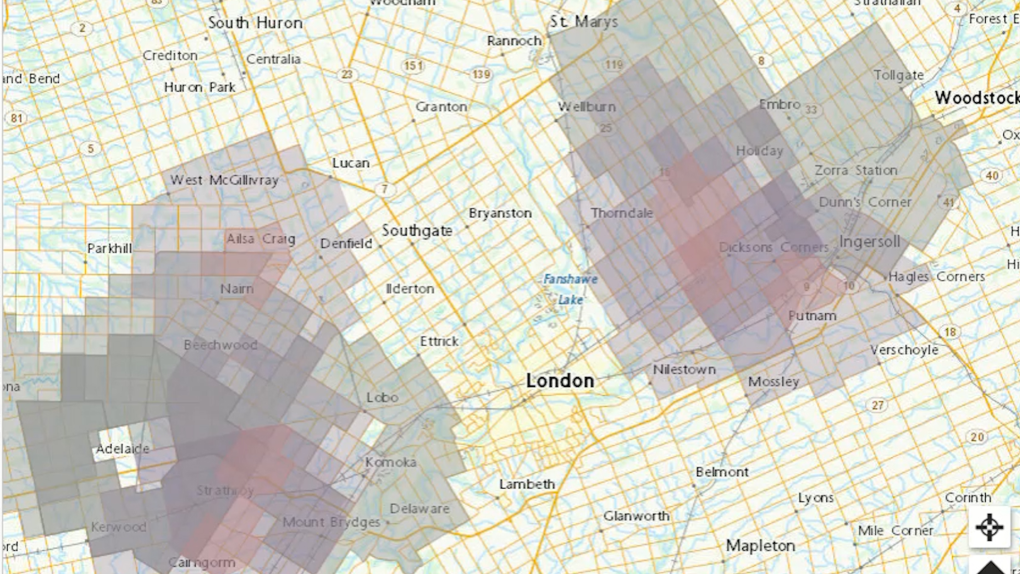Bird flu investigations in wildlife surround London, Ont. as first human death reported in U.S.
A local avian expert wants municipal and federal health authorities to increase public education efforts in the wake of rising cases of bird flu (H5N1) in humans in the United States.
“I think just making sure that people are aware that if there are these risk factors, that they should be aware of, that they're doing their due diligence to prevent harm,” said Brendon Samuels, a Western University PhD candidate, who had just chaired an environmental stewardship and action group on behalf of the City of London.
His advisory comes as the Canadian Food Inspection Agency investigates bird flu cases at commercial facilities east and west of London.
While all cases remain contained to wildlife, health officials in the United States face a more serious threat.
There, a 65-year-old Louisiana man has died after contracting avian flu, likely from domestic backyard birds. It is one of nearly 70 human cases in America. All but one were diagnosed within the past 10 months.
While there has been no evidence of human-to-human transmission, Samuels believes it is time for southwestern Ontario-area health officials to prepare.
 Map of bird flu investigations and orders – in wildlife only – surrounding London, Ont. as of January 2025. (Source: CFIA)
Map of bird flu investigations and orders – in wildlife only – surrounding London, Ont. as of January 2025. (Source: CFIA)
“In terms of public information about when it might be time to think about if we need to wear masks again, if we need to take down our bird feeders, if we need to understand our personal risk, like if we're keeping backyard chickens. It would be nice to see a bit more current information from our local health unit on this, or perhaps some federal authorities, about best practices in the London region, being that we're seeing outbreaks in facilities just outside of town,” he said.
The medical officer of health contends more information will be coming if the situation worsens. But, with only one confirmed human case in Canada, Dr. Alex Summers contends, “The human health risk from avian influenza remains very low.”
Dr. Summers shares concerns about the evolving virus and the potential for human-to-human transmission.
“The risks of mutation development are real, and it is something that requires ongoing monitoring.”
Still, as health experts begin to brainstorm a response to the bird flu, Summers advises area residents are better suited to focus on the risks of general influenza and COVID-19.
CTVNews.ca Top Stories

BREAKING Ontario pitches energy partnership amid Trump's threats of tariffs, Canada acquisition
In the face of incoming U.S. president Donald Trump’s threat to acquire Canada, Ontario Premier Doug Ford is touting the strength of the province's energy supply to generate revenue and jobs on both sides of the border.
LIVE UPDATES Tracking the L.A. wildfires: 2 dead as major fires at 0% containment, locals describe 'terrifying' escape
A series of wildfires are searing through the Los Angeles area, forcing many to evacuate their homes. Follow along here for the latest updates. Numerous buildings were destroyed and nearly 3,000 acres burned in the Pacific Palisades. Weather conditions are expected to deteriorate further through today.
Canada among 'top 5 losers' in new passport ranking
A new global ranking may raise doubts about Canada's reputation of being open to other countries.
Mexico's President Sheinbaum offers sarcastic response to Trump's 'Gulf of America' comment
Mexico's President Claudia Sheinbaum responded sarcastically on Wednesday to U.S. president-elect Donald Trump's proposal to change the name of the Gulf of Mexico to the Gulf of America.
WATCH 'Like driving through hell itself': Apocalyptic scene on L.A. highway
Terrifying video shows a California resident’s drive along the Pacific Coast Highway in Los Angeles, as the Palisades wildfire engulfs buildings and homes.
Minister LeBlanc not running for Liberal leadership, as caucus meets for first time since Trudeau resignation
Longtime cabinet minister Dominic LeBlanc will not be running to replace Prime Minister Justin Trudeau as head of the Liberals. He announced his decision in a statement posted to social media on Wednesday.
Is Donald Trump kidding? Americans in Canada react to tariff, annexation threats
While Donald Trump's comments on tariffs and Canada becoming 'the 51st state' have drawn anger and fear among Canadians, reaction from Americans who live, study or work in Canada has been mixed, and is largely influenced by how they voted in the presidential election.
Ricki's and cleo retail brands closing, Bootlegger restructuring
Several Canadian fashion retailers will be closing their doors after ownership company Comark Holdings announced it has filed for creditor protection.
Hollywood stars forced to flee amid devastating Los Angeles wildfires
Large parts of Los Angeles County are under evacuation orders Wednesday as massive wildfires spread through the megacity's hilltop suburbs. Here is what some of the stars are seeing from their backyards.
































